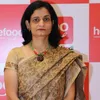Meet Deepthi Ravula, who leads WE Hub, India’s first state-led incubator for women entrepreneurs
Deepthi Ravula is the CEO of WE Hub, the Government of Telangana’s incubation hub for women entrepreneurs.
After spending 15 years in the US in blue-chip companies, when Deepthi Ravula got an opportunity to be part of the vision and growth story of her home state, Telangana, she jumped at the offer.
K T Rama Rao, Minister for IT E&C, Government of Telangana was visiting the US, and Deepthi got an opportunity to interact with him, having worked with his team on several initiatives before the formation of Telangana and after. In the process, she was offered a job to be part of the Electronics Department, Government of Telangana, and that’s how everything began.

“Although I have lived outside India, I have always maintained a connection with Telangana. My heart was always with my motherland. Moreover, sometimes, when you live outside your country, it’s surprising how much you feel that you have given up. I realised that there was a lot that needed to be done here in India. And to do those things, I had to go back and do them. I got this fantastic opportunity to be a part of the vision and growth story of Telangana, and that was a cherry on top,” she recalls.
Returning for greater good
Deepthi had moved to the US in 2002 after completing her secondary education in Hyderabad. After completing her Bachelor’s and Master’s in Electronics and Communications, her first job was at Nokia, working with audio acoustics. She moved to Palm to work with smartphones and after a three-year stint there she shifted to Atheros, now known as Qualcomm, which was involved in the making of WiFi and Bluetooth chips.
Post , she worked at Litepoint, which was later acquired by Teradyne. Her entire 15-year journey, she says, consisted of growing, learning, and experiencing the technological breakthroughs, which led to the 4G and 5Gs that we talk about today.
On her return to India, Deepthi joined the Government of Telangana in 2016 as Joint Director for Electronics. “It was fascinating and exciting for me to apply my technical and corporate expertise to policy implementation, research, policy evangelism, and investment promotions,” she says.
While into her job, Deepthi became aware that the Government of Telangana had envisioned several policies to support women entrepreneurs. Seven women approached them directly for help. It was identified as a major problem by the team and often discussed at meetings.
Spotlight on women entrepreneurs

Around the same time, the Global Entrepreneurship Summit (GES) was held in Hyderabad with the theme ‘Women First, Prosperity for All.’
“This summit sparked a conversation that led to an immediate action of creating a platform that encourages, scales up, and creates a funnel for more women to be a part of the entrepreneurial ecosystem. That’s how came into being. The minister announced WE Hub on November 30 2017, and I was appointed CEO since inception,” Deepthi says.
She says that while WE Hub is just starting out, she firmly believes they are moving in the right direction
noting its achievements in the past year:
- Provide assistance to close to 450 women entrepreneurs across socio-economic and operational capacities.
- Create an impact in terms of showcasing the friendly and collaborative ecosystem in India to multiple international organisations and diplomatic missions in India.
- Been able to create or rather democratise how entrepreneurship is viewed across urban and rural sectors. WE Hub has the ethos of recognising an entrepreneur for who she is, irrespective of her background.
Platform for every woman

We Hub is a first on many fronts. It’s the first state-led incubator for women entrepreneurs.
Deepthi explains, “When we say women entrepreneurs, we are referring to those entrepreneurs who are leading teams, enterprises owned by women and where a woman is the biggest stakeholder. But the key differentiator is that WE Hub is a sector-agnostic incubator, which works with every incubator across the country, and we are happy to forge collaborations with IIT, IIIT, NSRCEL, AIDEA Naarm, and many more.”
“We also partner extensively with academia to ensure that we enable more girls and women to be a part of the entrepreneurial ecosystem. We have partnered with Cambridge University, UK, TISS, and many more. While being an incubator, we are also an enabler for girls and women in technology & entrepreneurship, policy implementation, and credit linkages. We also are working with corporates to enable intrapreneurship and corporate innovation programmes,” she adds.
WE Hub has spawned many success stories, a few of which Deepthi shares with HerStory.
Startoon Labs by Mythreyi Kondapi, an IIT-alumnus, is currently working on Pheezee, the world’s first smart physiotherapy toolkit. Radhika Rajoju from Parakal in Warangal district is a tailor who had dreams of starting a garment factory. With the intervention of We Hub, she received an investment of Rs 5 lakh for her venture, Meenakshi Clothes. From a software engineer, Sahithya Raj has grown into a commercial supplier of bakery products with her startup Sweet Tooth.
Despite these successes, Deepthi agrees that there are enormous challenges faced by women entrepreneurs in India.
“WE Hub is a very visible platform and any woman – be it an aspiring entrepreneur or someone who is just starting out or looking to scale – can approach WE Hub for assistance. We have various support mechanisms for them, such as ideation assistance, product refinement, business modelling, financial modelling, market access, technical mentoring, and technological assistance. However, the one aspect that WE Hub has been able to do very well is to bring the entire ecosystem on one collaborative platform to enable and foster women entrepreneurship,” she says.
WE Hub is also taking efforts to attract women entrepreneurs from rural areas. It has collaborated with German Development Agency to run a seven-month incubation (for early-stage women-led micro-enterprises) and acceleration (growth-stage women-led micro-enterprises) programme for women-owned and women-led enterprises in Tier-II and Tier-III cities of Telangana. The primary aim of the project is to encourage the participation of women in entrepreneurship. Going forward, the learnings and outcome of this project will be replicated by the Ministry of Skill Development and Entrepreneurship.
Science and also the arts
At WE Hub, Deepthi reveals, the focus is also to attract and encourage young girls to STEAM, a step ahead of STEM that also includes the Arts.
“We realised that to increase the funnel of women who want to be entrepreneurs, we need to start at the very beginning. It means creating a constant engagement to ensure that more girls choose and excel in the field of Science, Technology, Engineering, Arts, and Mathematics (STEAM). It will not only broaden their perspective but also increase their horizon to venture into entrepreneurship,” she says.
Deepthi says she has absolutely no regrets leaving the US to return to work with the Telangana government in India.
“Regrets happen when you compare and try to compete. I feel truly fulfilled and blessed to have had the opportunities I have had in the past and what I do now. I do not usually set any plans. My only plan is to take things as they come and make the most of every opportunity,” she signs off.
(Edited by Evelyn Ratnakumar)









